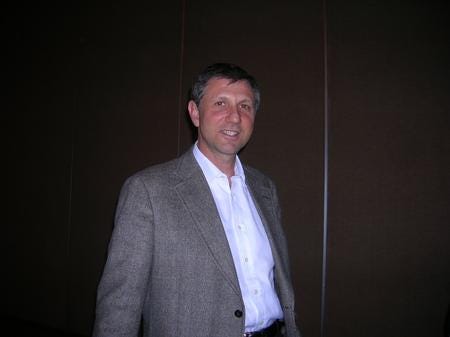Georgio Anania, Ex-CEO, Bookham
'We had more ups and downs than a lot of people on the outside knew about'

The biggest surprise at last week's The Optical Society (OSA) Executive Forum came in the first minute: Georgio Anania was there, sitting in the second row.
He's newly unemployed, after a six-year tenure as Bookham Inc. (Nasdaq: BKHM; London: BHM)'s chief executive, leaving after yet another disappointing slate of quarterly earnings. (See Bookham Ousts CEO Anania.) And yet there he was, and not in stealth mode; Anania had agreed to help give a closing talk at the day-long conference, which precedes OFC/NFOEC. (See Video Hopes Boost Optics.)
In baseball, it is possible for a pitcher to throw the game of his life and yet lose because of poor fielding, weak offense, or just bad luck. Anania describes his former job similarly. He still roots for Bookham and sticks to his insistence that the company will be EBITDA-positive (minus restructuring charges) by September.
But it's been a tough road since 2003, when Bookham acquired the optical components businesses of Marconi Corp. plc and Nortel Networks Ltd. , hoping to build a powerhouse second only to market leader JDSU (Nasdaq: JDSU; Toronto: JDU).
Instead, Bookham was mired in continual restructuring as it moved test and assembly out of the U.K. to a top-notch facility in Shenzhen, China. Even with that move mostly complete, every quarter seems to bring some new glitch that prolongs Bookham's problems; it's become the Murphy's Law of tech companies.
Bookham's plans were big, involving acquisitions that would help lessen the oversupply of components vendors, something most industry players still think needs to happen. But a proposal with Finisar Corp. (Nasdaq: FNSR) and a rumored one with Avanex Corp. (Nasdaq: AVNX), didn't come through. (See Optomania, Will Avanex Hook Bookham?, and Finisar: Bookham Wouldn't Wash.)
Anania wouldn't 'fess up to specific merger attempts, but he does say Bookham wanted to strike a big deal. It just never got the chance. Meanwhile, its struggles continued, and after the most recent earnings disappointment, Anania left in what's being called a mutual agreement.
Anania gave Light Reading an extended interview three years ago. (See Giorgio Anania, Bookham.) And he was glad to talk again after the Executive Forum, but it took a while, as one well-wisher after another stepped up to shake his hand and receive his new business card, which shows no title, no company, and a mailing address near Paris. Read on for his views on where Bookham went right, what went wrong, and why the big mergers haven't come to the optical space:
Read on for his views on where Bookham went right, what went wrong, and why the big mergers haven't come to the optical space:
— Craig Matsumoto, West Coast Editor, Light Reading
Next Page: Italian Villages
LR: Why did you leave Bookham?
Anania: Without talking about why I left in February versus March or April – five years ago, my wife left England and returned back to Paris. I've been for years saying I can't have a wife in France, a business in England, and headquarters in California forever. At some point, you don't think twice. When the right moment exactly is, whether it would be better to wait six months – those are internal politics issues.
Maybe the moment was something that just made sense for various reasons. But strategically speaking, it's been a while that I've been looking for a good reason, after nine years. If this had been where my family was, I could have kept going for a while. But at some point... [shrugs]
As for why exactly now, some things are sensitive. I can't say.
LR: The perception some people are going to have is that the last bit of bad news was the last straw, and you were pushed out.
Anania: Fine, fine. I'm not going to say yes or no. It's clear that this is a low point for Bookham. You'll find out in a month – if they start steering up, it was clearly a temporary effect.
I think the things that we put in place will get Bookham to EBITDA positive. I've said in February in the conference call, I strongly believe it will be adjusted EBITDA positive, i.e., without restructuring charges, by September.
LR: So if that happens, you'll have been proven right.Anania: [a no-comment shrug]
LR: You've been asked this repeatedly today, but what are you going to do?
Anania: Soon enough, I'll have to think about something. It could be fiber optics, it could be elsewhere. But it's going to be meaningful, because I can throw in my 80 hours a week and make things happen, but it's got to be worthwhile.
You may see me joining some company boards just to help out people. That's not a full-time job. I'm happy to do that.
LR: So, you don't see yourself gardening for the next decade or so.
Anania: No, if I see myself gardening, I'll be planning a gardening business.
I'll take a sabbatical. I haven't started my next thing because when you do, the next thing needs you immediately. I want to take time and go through some Italian villages. I want to get bored a little.
LR: Do you find it frustrating that you weren't able to complete the Bookham turnaround while you were still there?
Anania: The frustration is that because of various things, we were not able to get the mergers going, even though we were within inches, many times. I think the strategy was correct. But the things that happened – Nortel hiccups, dollar effects...
Next Page: Deal or No Deal
LR: Dollar effects – let's talk about that.Anania: The dollar falling 25 percent versus the pound should have killed us. Because we were close to the edge. Without that, Bookham would have succeeded, because in a year and a half, it would have become profitable, instead of three or four.
The only company that happened to was Bookham, because it wasn't about the euro versus the dollar, it was the pound vs. the dollar. A 25 percent change? You start off with an idea that's perfect, and that alone changes it. It added two more years of restructuring and financing. So, that was two more years of pain.
Now, once we would have gotten profitable, we would have moved very quickly to do the domino effect.
LR: You mean, mergers.
Anania: Yeah. Because the market was still down, companies were weak, and you had yourself in a good position. That's when you go out, and if you've got guts – which we always had – then you make it happen.
LR: Why didn't it happen, then? You picked up some little pieces. [See Bookham Buys Onetta.] But what about a big deal?
Anania: Now, remember, everything I say is as a private individual.
Bookham, from the beginning, never had enough cash. And we had – well, I don't want to say anything about the Nortel business, but three or four times, they almost killed us by mistake. Almost every year, in the Q1, there was a massive surprise. Avanex has had a growth like that [arm indicating an upwards angle]. We were always ahead, but then we'd go down [zig-zag motions].
Bookham had enough of a cash issue that people were always worried about the financing of Bookham and not about the product choices. Because they were worried about that, the valuation was lower. Because the valuation was lower, you're always talking about acquiring people at a premium. You had to really negotiate, and then it was a harder decision.
The trouble was, whenever we got close we had the dollar thing. And then we had Nortel's big revenue drop for six quarters. Six quarters in this market – that's a very long time to be frozen. Having said that, they've hit the bottom.
LR: Their ups and downs have been as entertaining as Bookham's.
Anania: I can't comment on that.
LR: It sounds like you think some potential deals are still out there, though.
Anania: I can tell you no-brainer deals that should be done. I can give you the example of [off-the-record merger idea that, theoretically, could create $200 million in value immediately].
The idea of a merger isn't just to become profitable. It is to release enough new R&D investment dollars profitably. That really is the key, because now, the market is moving. You can't be unprofitable and increase R&D spending. If you were part of something bigger, you'd say you don't need two sales forces, you don't need two CEOs, you don't need two design teams for a certain part. And you take that savings and you invest it in the new technology.The market clearly wants something like that. But there's a premium for the first two or three guys to do it. The first couple of guys are going to make money; the third, fourth, and fifth guys are probably going to lose money.
LR: Why doesn't this happen, then?
Anania: It makes financial sense, but there are big cultural issues and people issues. You're buying lots of pieces, not cherry picking what you want. You're buying lots of people. You're buying the culture. It's not so easy to find. You need two CEOs who think alike and who both have guts.
A lot of people think they can get to profitability by themselves. They can stop losing money by themselves, but when you talk about doing a leapfrog, you really need a macro-merger. Plus, it takes another year of restructuring. Right now, probably, people are going to go off and buy little companies before they do a macro-merger.
One thing that could make it happen is if some of the players that indicated an interest in merging, like Bookham and others, finish their restructuring and get EBITDA positive. That eliminates a whole other risk.
Next Page: Slow Going
LR: From what you've said, it sounds as if the longer restructuring period affected Bookham's product plans.
Anania: It took a fair bit of time and forced an under-investment in some product areas. Bookham has the best tunable laser around, but we had it in '02. We just put it on the back burner because we were too busy with fabs and then moving assembly and test, and that was three years' waiting.
Bookham, I believe, will catch up in that market because it's a strong product offering. But it would have been a no-brainer to have a 90 percent market position if they had started a year earlier.
Up to now, the idea was that the legacy business was going to be restructured fast enough to provide cashflow to finance new technology. Instead, legacy took longer and actually absorbed the cash. So, companies starting almost from scratch had a better position. Now, legacy is getting to break-even.
LR: How about the ramp-up in Shenzhen [Bookham's China facility]? That ran into delays too, it seemed.
Anania: You couldn't move some things to China 12 months ago, because China wasn't ready. It ramped up in manufacturing, but it wasn't ready to do more R&D, or more manufacturing planning. You give them some stuff, and you find out that they don't do it right, so you give them two or three months to get better at it. Then, when you're in control again – now you can do another wave. You can't do it before.
Light Reading: So, how would you assess your time with Bookham?
Georgio Anania: It has been a phenomenal human adventure. I think we had more ups and downs than a lot of people on the outside knew about. A lot more. We had the courage to try to change the world. With ASOC [Bookham's original optical chip], we got to a $10 million market cap.
LR: ASOC, right! I forgot about that.
Anania: It would have done it, but the market went down. Then, when people didn't believe in the optical business, we went out and we bought Marconi and Nortel from nothing. We had, like, a $2 million-a-quarter business and we turned it into No. 2 in the world, and that was not because of any particular position. It was basically believing in it, courage, and then strong execution after that.
— Craig Matsumoto, West Coast Editor, Light Reading
About the Author(s)
You May Also Like




.jpg?width=300&auto=webp&quality=80&disable=upscale)







